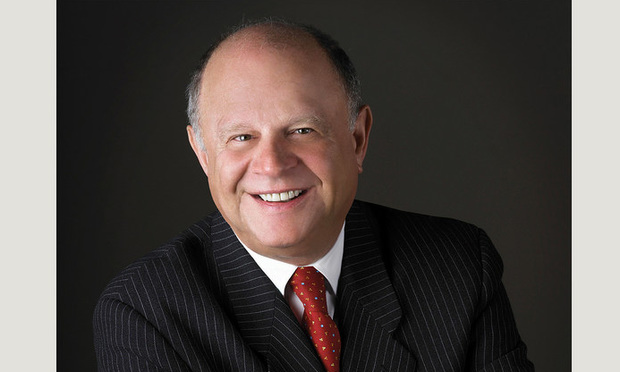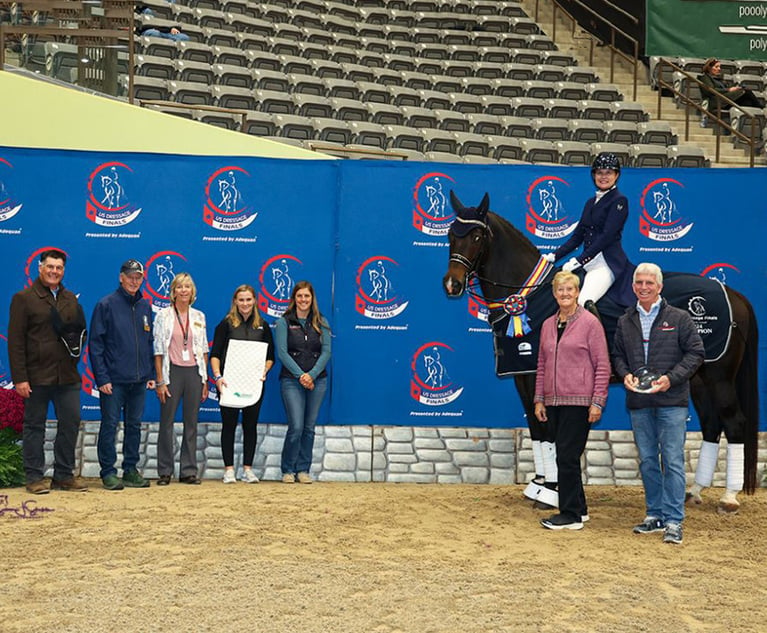Greenberg's Katz, Denying Grammy Chief's Claims, Vows to Reveal 'Whole Truth'
Katz' response came soon after Deborah Dugan's sexual harassment complaint, which also details concerns about "'plainly exorbitant" fees the academy was paying Greenberg Traurig and others.
January 22, 2020 at 05:42 PM
6 minute read
 Joel Katz, Greenberg Traurig, Atlanta. (Courtesy photo)
Joel Katz, Greenberg Traurig, Atlanta. (Courtesy photo)
Greenberg Traurig shareholder Joel Katz, the founder of the firm's entertainment practice and its Atlanta office, is fighting back against newly filed sexual harassment claims, with his lawyer saying Katz "categorically" denies the allegations.
Katz' lawyer, Howard Weitzman of Los Angeles boutique Kinsella Weitzman Iser Kump & Aldisert, said in a statement that the Greenberg shareholder will cooperate in any investigation or lawsuit by "telling the absolute and whole truth."
Weitzman was responding to claims made by Deborah Dugan, the recently suspended president and CEO of Katz' client, the National Academy of Recording Arts and Sciences, in a Jan. 21 complaint she filed with the Equal Employment Opportunity Commission. Dugan alleges she was put on leave from her position last week after complaining that Katz—general counsel to the academy and a former board member—had sexually harassed her, starting from before she took the position on Aug. 1, 2019.
According to Dugan's EEOC complaint, the academy pays Katz a $250,000 annual retainer, plus expenses, for legal services. In addition to the sexual harassment claims, Dugan's EEOC complaint said she raised concerns with the academy's board about the large sums it was paying Katz's firm, Greenberg Traurig, as well as Proskauer Rose and other firms, and she had announced that she intended to hire in-house counsel to handle some of that work.
Katz' lawyer, Weitzman, in a statement first obtained by The Hollywood Reporter, responded within hours of Katz' claims becoming public on Jan. 21—and before the 2020 Grammy Awards show on Sunday: "Ms. Dugan's allegations of harassment and her description of a dinner at the steakhouse in the Ritz Carlton, Laguna Niguel are false, and Mr. Katz categorically and emphatically denies her version of that evening."
Dugan's EEOC complaint alleges that Katz invited Dugan to a private dinner on May 18, 2019, at the Ritz-Carlton, Laguna Niguel, on the eve of a three-day meeting of the academy's board that she had been invited to attend in advance of becoming the group's new president and CEO on Aug. 1, 2019.
At the dinner, according to the EEOC complaint, Katz called Dugan "baby" and told her repeatedly that she was "very pretty." He also told her he was "very, very rich," with many homes and a private plane and suggested they "spend time together."
Dugan "made it clear that she was not interested in Mr. Katz's advances," the complaint said, and subsequently rebuffed Katz's attempt to kiss her at the end of the dinner. In subsequent conversations, Katz continued to refer to Dugan as "baby" and comment on her looks, the complaint added.
But Katz' lawyer, Weitzman, said in the statement: "This dinner meeting was 2½ months before Ms. Dugan started her job. Mr. Katz believed they had a productive and professional meeting in a restaurant where a number of members of the Board of Trustees of the Academy, and others, were dining. Ms. Dugan's claims are made, for the first time, 7 months after this dinner took place. Mr. Katz will cooperate in any and all investigations or lawsuits by telling the absolute and whole truth. Hopefully, Ms. Dugan will do the same."
'Plainly Exorbitant' Fees
According to Dugan's EEOC complaint, the academy paid Greenberg Traurig for over $15 million in legal services over several years.
According to the complaint, music critic Bob Lefsetz wrote a Jan. 20 letter to a Greenberg Traurig attorney that said the academy paid Greenberg Traurig $1.17 million in 2015; $6.3 million in 2016 (to renegotiate its $20 million per year deal with CBS to telecast the Grammy Awards show); and $1.76 million in 2017. In 2017, the group also paid Proskauer Rose $906,691 and another $3.74 million to other outside counsel in legal fees, Lefsetz's letter said, for a total of over $6 million in 2017 legal fees for the nonprofit.
Dugan told the academy's HR director, Shonda Grant, of her concerns in a Dec. 22 email, which is attached to the EEOC complaint. In addition to the claim of sexual harassment by Katz, Dugan said in the email that it was a conflict of interest to have outside counsel for the academy also represent individual board members, executive committee members and news outlets that cover the academy–and that legal fees paid to Greenberg Traurig, Proskauer Rose and other firms were "plainly exorbitant for a not-for-profit company the size of the Academy."
In that email to Grant, Dugan wrote: "In the course of that [May 18] meal, I relayed to Mr. Katz that I had reviewed the Academy's finances and found that his and other legal bills for a not-for-profit of this size seemed exorbitant. I questioned why there was no in-house lawyer as is customary. I relayed that having an in-house attorney made sense to me and was something I wanted to explore once I started. He agreed with me on my assessment."
Dugan told the academy's board in November 2019 that the organization was a "boys' club" and she planned to make reforms to "create a culture of diversity," the complaint said. She also recommended that the board decrease payments to male outside counsel, the complaint said.
Last December, Dugan publicly stated that the academy would seek to hire in-house counsel to handle work being performed by Greenberg Traurig and Proskauer Rose, according to the complaint, which it said "would have saved the Academy millions of dollars."
But the complaint said Dugan received a Dec. 9 email from academy board chair Harvey Mason stating that she was no longer permitted to hire or terminate staff members without board approval, was prohibited from assigning any new initiatives to staff members for at least two months and was prohibited from choosing outside counsel.
Through her attorney, Bryan Freedman, Dugan put the academy on notice on Dec. 24 of her intention to pursue legal claims. Freedman was in negotiations with the academy's lawyer, Tony Oncidi of Proskauer Rose, but settlement negotiations stalled at the eleventh hour earlier in January when the academy "backed out of the deal" and presented a "new unfavorable deal" to Dugan, the complaint said. Dugan had asked for a $22 million settlement to exit, according to Billboard.
Dugan did not accept the academy's revised settlement deal, and the board placed Dugan on administrative leave on Jan. 16, which her EEOC complaint claims was retaliation.
This content has been archived. It is available through our partners, LexisNexis® and Bloomberg Law.
To view this content, please continue to their sites.
Not a Lexis Subscriber?
Subscribe Now
Not a Bloomberg Law Subscriber?
Subscribe Now
NOT FOR REPRINT
© 2025 ALM Global, LLC, All Rights Reserved. Request academic re-use from www.copyright.com. All other uses, submit a request to [email protected]. For more information visit Asset & Logo Licensing.
You Might Like
View All


'It Refreshes Me': King & Spalding Privacy Leader Doubles as Equestrian Champ
5 minute read
Federal Judge Rejects Teams' Challenge to NASCAR's 'Anticompetitive Terms' in Agreement
Trending Stories
- 1Uber Files RICO Suit Against Plaintiff-Side Firms Alleging Fraudulent Injury Claims
- 2The Law Firm Disrupted: Scrutinizing the Elephant More Than the Mouse
- 3Inherent Diminished Value Damages Unavailable to 3rd-Party Claimants, Court Says
- 4Pa. Defense Firm Sued by Client Over Ex-Eagles Player's $43.5M Med Mal Win
- 5Losses Mount at Morris Manning, but Departing Ex-Chair Stays Bullish About His Old Firm's Future
Who Got The Work
J. Brugh Lower of Gibbons has entered an appearance for industrial equipment supplier Devco Corporation in a pending trademark infringement lawsuit. The suit, accusing the defendant of selling knock-off Graco products, was filed Dec. 18 in New Jersey District Court by Rivkin Radler on behalf of Graco Inc. and Graco Minnesota. The case, assigned to U.S. District Judge Zahid N. Quraishi, is 3:24-cv-11294, Graco Inc. et al v. Devco Corporation.
Who Got The Work
Rebecca Maller-Stein and Kent A. Yalowitz of Arnold & Porter Kaye Scholer have entered their appearances for Hanaco Venture Capital and its executives, Lior Prosor and David Frankel, in a pending securities lawsuit. The action, filed on Dec. 24 in New York Southern District Court by Zell, Aron & Co. on behalf of Goldeneye Advisors, accuses the defendants of negligently and fraudulently managing the plaintiff's $1 million investment. The case, assigned to U.S. District Judge Vernon S. Broderick, is 1:24-cv-09918, Goldeneye Advisors, LLC v. Hanaco Venture Capital, Ltd. et al.
Who Got The Work
Attorneys from A&O Shearman has stepped in as defense counsel for Toronto-Dominion Bank and other defendants in a pending securities class action. The suit, filed Dec. 11 in New York Southern District Court by Bleichmar Fonti & Auld, accuses the defendants of concealing the bank's 'pervasive' deficiencies in regards to its compliance with the Bank Secrecy Act and the quality of its anti-money laundering controls. The case, assigned to U.S. District Judge Arun Subramanian, is 1:24-cv-09445, Gonzalez v. The Toronto-Dominion Bank et al.
Who Got The Work
Crown Castle International, a Pennsylvania company providing shared communications infrastructure, has turned to Luke D. Wolf of Gordon Rees Scully Mansukhani to fend off a pending breach-of-contract lawsuit. The court action, filed Nov. 25 in Michigan Eastern District Court by Hooper Hathaway PC on behalf of The Town Residences LLC, accuses Crown Castle of failing to transfer approximately $30,000 in utility payments from T-Mobile in breach of a roof-top lease and assignment agreement. The case, assigned to U.S. District Judge Susan K. Declercq, is 2:24-cv-13131, The Town Residences LLC v. T-Mobile US, Inc. et al.
Who Got The Work
Wilfred P. Coronato and Daniel M. Schwartz of McCarter & English have stepped in as defense counsel to Electrolux Home Products Inc. in a pending product liability lawsuit. The court action, filed Nov. 26 in New York Eastern District Court by Poulos Lopiccolo PC and Nagel Rice LLP on behalf of David Stern, alleges that the defendant's refrigerators’ drawers and shelving repeatedly break and fall apart within months after purchase. The case, assigned to U.S. District Judge Joan M. Azrack, is 2:24-cv-08204, Stern v. Electrolux Home Products, Inc.
Featured Firms
Law Offices of Gary Martin Hays & Associates, P.C.
(470) 294-1674
Law Offices of Mark E. Salomone
(857) 444-6468
Smith & Hassler
(713) 739-1250






